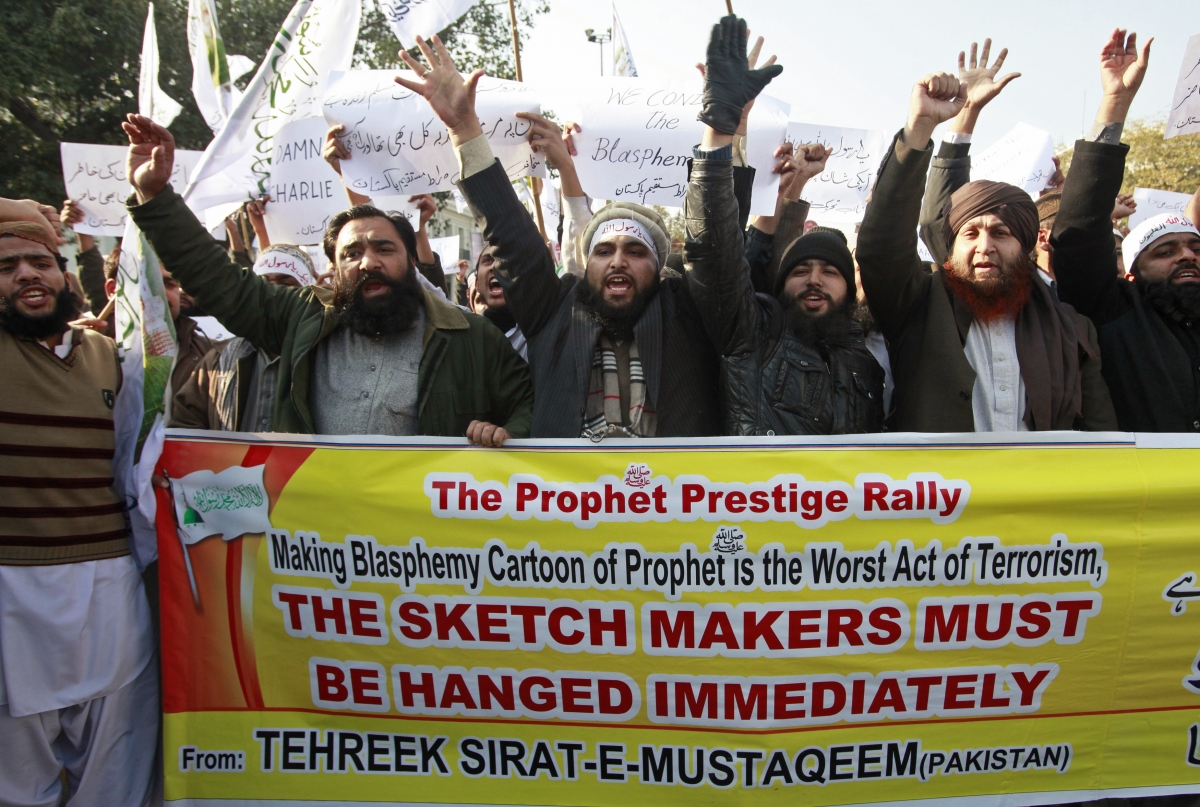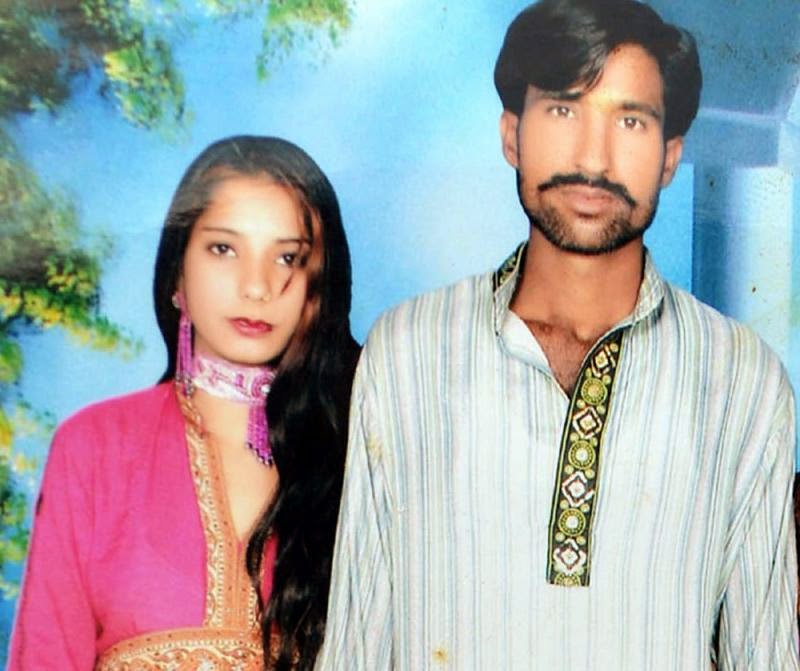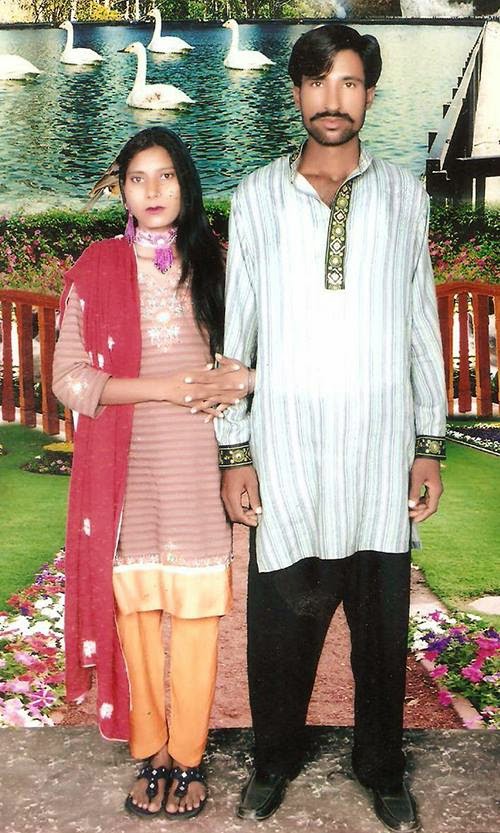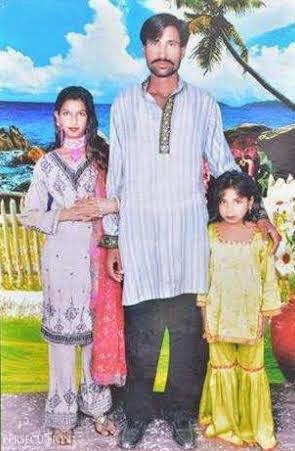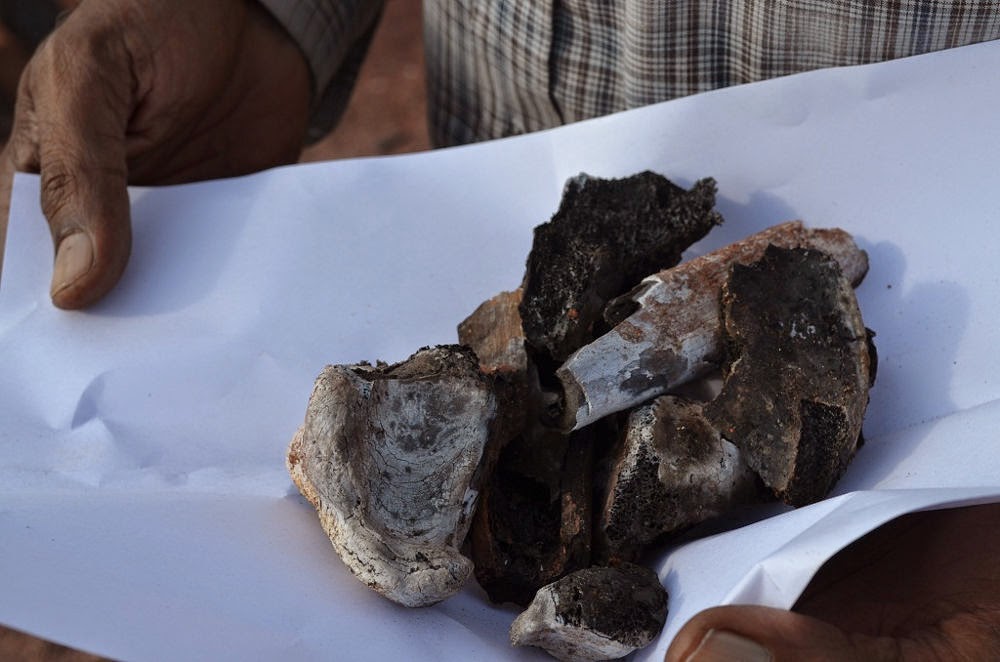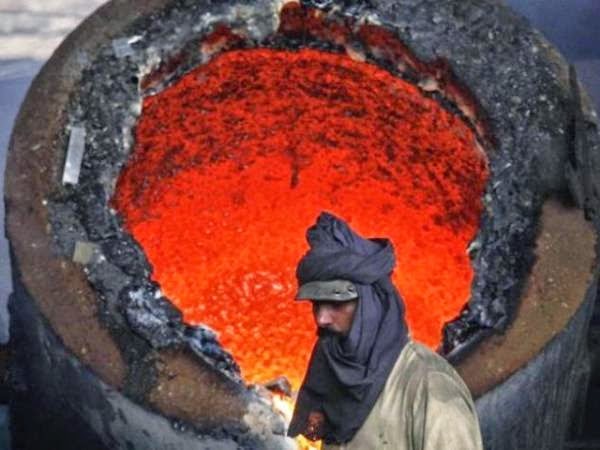Shama and Shahzad Masih were poor Christians who lived in the small village of Chak 59 in the Tehsil (subdivision) of Kot Radha Kishan near Lahore. It is not a remote area (though some orientalist in the BBC has managed to describe it as such), being a well developed center of the leather industry lcoated only 60 kilometers from the provincial capital of Lahore on a major national highway (and is the home of 2 former prime ministers of Pakistan!). Like many other poor people in their village, they worked as modern-day slaves in the local brick kiln. This, by the way, is not an exaggerated or poetic description of their employment status; bonded labor in brick kilns in India and Pakistan is internationally recognized as a type of modern slavery and involves many of the abuses known to us from books and movies about slaves in the days of yore.
The young couple had 4 children: Solomon (8) and Zeeshan (5) had been given to an uncle for adoption, probably due to the parent’s poverty. Sonia (4) and Poonam (18mths) lived with them and Shama was pregnant again with her fifth child. Her father-in-law had died recently and a few days later Shama cleaned out his room and disposed of his old papers by burning them. He had been an “amil” (a folk healer) who used various religious texts in his amulets and suchlike, and the burnt papers apparently included some with arabic writing on them. Shama, who was illiterate and so could not read them in any case, burnt the lot and threw the remains on a nearby garbage heap.What happened next is best described in this report from World Watch Monitor (corroborated to me by a friend in the police as the best description of the event):
“On Sunday, Shama burned them all and threw the ashes on a garbage heap outside their quarters. Shama never meant any disrespect to Islam as she was totally illiterate and had no idea what the amulets contained,” she said. “A few people recognized partially burned pages in the ash and raised a cry that Shama had burned the Qur’an.”
Shahzad Masih and his five brothers worked for many years at the brick kiln, owned by Yousuf Gujjar. Parveen said Shahzad and his brothers went to Gujjar to resolve the matter after the situation got tense in the village. “Gujjar on the one hand assured us that nothing would happen, and on the other hand asked his accountant not to let Shahzad and Shama flee the village without paying back their bond money”, (taken from them as an ‘advance’ against their employment and wages).
By Monday night, some Muslim neighbors had informed the police of the alleged desecration and warned of a possible attack on the Christian couple, Parveen said. “That night I had Shahzad and Shama sleep in my home so that if the police arrested them, at least we would know.”At about 6 a.m. when Shahzad and Shama went back to their own home in order to prepare for work, an angry mob began pouring into their quarters. Sensing the danger all the Christians fled except Shama’s sister Yasmeen (married to Shahzad’s brother Fiaz Masih).Yasmeen said they were still preparing breakfast when a few more people knocked at their door and enquired about Shama.
“They entered the house and one of the men dragged Shama out. Shama had their youngest daughter Poonam in her arms. That man snatched Poonam and threw her on the floor…So brick kiln guard Muhammad Akram rescued Shama and took her to the kiln office (only a few yards away from their house) and locked her in there, to save her from the attackers.”
“By then, the number of mobsters was very small, but we could hear announcements being made from mosque loudspeakers in nearby villages – that a Christian woman had desecrated the Qur’an”.Yasmeen said people from five surrounding villages – Chak 60, Rosey, Pailan, Nawan Pindi and Hatnian – were gathered together by the residents of Chak 59 and their brick kiln coworkers.“
Soon thousands of men armed with clubs, hatchets and axes loaded onto tractors and trolleys began pouring in.(The guard) Akram had locked the main kiln office door from the outside, but the angry protestors broke in anyway. But they failed to break the iron door of the office inside, and Shama and Shahzad must have locked it from inside.”The angry protestors then climbed on to the roof, and broke it in, “as if it was made of wood, straw and mud” said Yasmeen.She says these men then opened the door from inside and brought the couple into the open, where the highly-charged protestors were ready to attack.
“They beat them with wooden clubs on their heads, and hatchets, before they were both tied to a tractor and pulled out onto a road which was under construction, covered with crushed stones.”“I think they were unconscious, but still breathing, but the mob was still not willing to leave them alone,” said Yasmeen. “They took some petrol from a tractor and doused their bodies and threw them in the kiln. Then I lost hope and fled with my children from there.”
Another relative, Parvaiz Shehzad, who also lives in Clarkabad, said that Muslims of neighboring villages “were very much jealous of Christians”. The village is named after Robert Clark (1825–1900), the first Anglican missionary to Pakistan. Parvaiz Shehzad said it was the first village in the district that had electricity, a bank, a post office and a high school.“Most educated people of surrounding villages had studied in in Clarkabad…Strife between the Christian villagers and Muslim villagers has been a common feature in recent years”.As Shehzad and Shama were of Clarkabad, he claims jealousy came into play.
The dead woman’s sister Yasmeen says that during the entire violent attack, a police van was present, but because they were so few, the police did not take charge. “Some men asked them to fire into the air to quell the protestors, because the mob had no weapons to fire back…Shama and her husband might have survived if the police had taken timely action.”
Heavy contingents of police did arrive at the scene after the crowd had killed the couple. A local media reports that the police have arrested at least 42 people in connection with the case.The police themselves filed the case and lodged the First Information Report (FIR), [no. 475/14], registered in Kot Radha Kishan Police Station. The FIR states that 500 to 600 men tortured the Christian couple. The FIR identifies 60 men by name and says that:“the incident took place after the above-nominated persons gathered a crowd of people and roused their passion though false announcements from the mosque (loudspeakers) of desecration of the Qur’an.”...
Another eyewitness reports that when the young couple, beaten to near death, were put into the fire, a large heavy iron sheet was put on top of them to hold them down; as if the crowd wanted to make sure that they would burn. As if there was ever any doubt. As if there could be a different ending after a mob had arrived to defend the honor of Allah and his prophet. As if this was not 2014 in Kot Radha Kishan (“stronghold of Radha and Krishna“). As if this was not Kalyug…
Several pictures of the couple have surfaced. We do not know if it was Shahzad or Shama who chose the backgrounds. (Note: I hv been told (and agree after looking again at the pictures) that it is not the same girl in all the pictures, some are with a cousin or niece of Shahzad, not with his wife Salma; this will no doubt become clearer with time; In any case, there seems to be no doubt about the picture of their last remains)
Yes, many thousands were killed in equally gruesome ways in 1947, in 1971, in 1984, in 2002; India, as Naipaul said, is a wounded civilization. But just look at these pictures…the contrast between the idyllic scenes depicted in the photographer’s backgrounds and the actual life of the poor couple was already harsh when they took went to the photographer in Clarkabad; the contrast between these beautiful, hopeful faces and their terrified, screaming last hour on earth is unbearable and unimaginable. Too painful for words. After such knowledge, what forgiveness?
Someone took a picture of the remains after the good people of Kot Radha Kishan had finished with the couple.
Burnt offering
What more can one say?
The government of chief minister Shahbaz Sharif has acted with some speed and 40 or so people have been arrested for this atrocity. The Prime Minister has expressed shock, condemned the incident, and promised to bring the guilty to book. Multiple organizations within Pakistan have condemned this murder and I have no doubt that millions of Pakistanis are shocked to the core. I also believe that both the chief minister and the prime minister are entirely sincere in their concern. They are not inhuman bastards and they are not dumb. They see this is a terrible atrocity and they know how ugly it looks to the rest of the world. But their best intentions will not prevent the next incident and the fact that the blasphemy law itself has been openly questioned in Pakistan after this incident will not lead to any change in the law.
Why not? Because the law runs deep and has real support among the people and, perhaps more to the point, serves real purposes for sections of the ruling elite. (the follow is modified from an earlier article I wrote about the blasphemy law)
A blasphemy law was part of the 19th century Indian Penal code as section 295 (this fact has allowed many a postmarxist to begin any discussion of blasphemy laws with the phrase “colonial era law”, God be praised).
Here is section 295 of the Indian Penal Code of 1860: Injuring or defiling place of worship with intent to insult the religion of any class.—Whoever destroys, damages or defiles any place of worship, or any object held sacred by any class of persons with the intention of thereby insulting the religion of any class of persons or with the knowledge that any class of persons is likely to consider such destruction, damage or defilement as an insult to their religion, shall be punishable with imprisonment of either description for a term which may extend to two years, or with fine, or with both.
This seems like an eminently sensible law and cannot really be blamed for all the evils that came later. But in the 1920s there was a famous case in Lahore where a Hindu publisher was arrested by the colonial authorities after Muslims agitated against him for having published a book called Rangila Rasul (“merry prophet”). But the court in Lahore (quite properly) found him innocent because there was no law on the books against just publishing a book, no matter how offensive it may be to some religious group. Fearing future communal discord from such provocations, the British then had the legislative assembly add section 295A to the law in order to criminalize deliberate attempts to “outrage the religious feelings of any community”). This section states:
Whoever, with deliberate and malicious intention of outraging the religious feelings of any class of citizens of India, by words, either spoken or written, or by signs or by visible representations or otherwise], insults or attempts to insult the religion or the religious beliefs of that class, shall be punished with imprisonment of either description for a term which may extend to 4[three years], or with fine, or with both.
But even with this new and expanded article 295A in place, prosecutions for blasphemy were few and far between until, in the 1980s, General Zia added two new sections to the law in Pakistan and really set the ball rolling. These infamous sections are labelled 295B and 295C.
295-B: Defiling the copy of Holy Qur’an. Whoever wilfully defiles, damages or desecrates a copy of the Holy Qur’an or of an extract there from or uses it in any derogatory manner for any unlawful purpose shall be punishable with imprisonment for life.
295-C: use of derogatory remarks etc., in respect of the Holy Prophet: – who ever by words, either spoken or written, or by visible representation, or by any imputation innuendo, or insinuation, directly, defiles the sacred name of the Holy Prophet Muhammad (PBUH) shall be punished with death, or imprisonment for life and shall also be liable for fine.
Note that the law
no longer requires that the offense be malicious in intent. Intent is no longer an issue. Insulting the Quran or the prophet, even unintentionally, is now punishable by death. To seal the deal, in 1991 the Federal Shariat Court of Pakistan struck down the option of life imprisonment and made the death penalty
obligatory. Between 1984 to 2004, 5,000 cases of blasphemy were registered in Pakistan and 964 people were charged and accused of blasphemy; 479 Muslims, 340 Ahmadis, 119 Christians, 14 Hindus and 10 others.
Thirty-two people charged with blasphemy were killed extra-judicially during that time. More have died since. Eighty-six percent of all the cases were reported in Punjab.
In the wake of this latest horrendous outrage, many liberal people are hoping that this blasphemy law can be changed to finally stop or slow down this torrent of prosecutions and killings. Others have noted that the law is not the problem, free lance enforcement of a broader blasphemy meme in the Muslim community is the problem and will likely persist even if the law is repealed. In my view the law is not the only problem, but it IS a very potent symbol of the surrender of state and society in front of the blasphemy meme. Repeal of the law will not kill that meme, but repeal of the law will be an equally powerful signal that things have changed and that state and society no longer approve of the killing of blasphemers. It will not end the problem, but it will be the beginning of the end. Repeal of the law is not a sufficient condition for this nightmare to end, but it is a very important necessary condition.
Unfortunately, I don’t think such repeal or amendment is actually likely in the foreseeable future. My predictions:
1. The law will not be repealed. Some minor amendments may be made someday (and even these will excite significant Islamist resistance and are not likely) but their effectiveness will be limited. Blasphemy accusations will continue, as will the spineless convictions issuing from the courts. In fact, new blasphemy accusations will almost certainly be made with the express intention of testing any new amendment or procedural change (thus, ironically, any amendment is likely to lead to at least one more innocent Christian or Ahmedi victim as Islamists hunt around for a test case).
2. Aasia bibi, the law’s most prominent current victim, will not get a reprieve from anyone but she will not be hanged. Instead, she will be held in prison till she dies or is killed by a vigilante in prison. Her immediate family will have to leave the country at some point. The local Christian community will have to clearly show their humble submission in order to be allowed to get on with their lives.
3. Blasphemy will continue to be a potent weapon in the hands of the deep state, the Islamists and sundry local gangsters and land grabbers.
These predictions may appear pessimistic and discouraging, but I would submit that they are not meant to be discouraging; they are meant to be realistic. The law will not be repealed because the law is not just an invention imposed by General Zia on an unwilling populace.
Rather, this law is the updated expression of a pre-existing social and religious order. Blasphemy and apostasy laws were meant to protect the orthodox Islamic theological consensus of the 12th century AD and they have done so with remarkable effectiveness. Unlike their Christian counterparts (and prosecutions for heresy and blasphemy were seen throughout the middle ages in Europe) these laws retain their societal sanction and have been enforced by free lancers and volunteers where the state has hesitated. The most famous, and in many ways, the most telling example of the wide societal sanction for killing blasphemers is the case of the carpenters apprentice
Ghazi Ilm Deen Shaheed, who executed the Hindu publisher of Rangila Rasul after legal prosecution had failed. The demand to kill Rajpal was being made openly in public meetings and two other Muslims had already attempted to kill Rajpal prior to Ilm Deen’s successful attempt. In fact Ilm Deen’s best friend had wanted to do the act and only stepped aside because they drew lots and Ilm Deen won thrice in a row.
And when he did do the deed the Muslim community mobilized to defend him and in the high court his appeal was handled by two lawyers, one of whom was none other than Quaid E Azam Mohammed Ali Jinnah, who was asked to take up the case by that illustrious modernist and “moderate Muslim hope”, Allama Mohammed Iqbal. After he was hanged by the British, Allama Iqbal was one of the leaders of a campaign to have his body brought to Lahore for reburial (he had been quietly buried in a remote prison by the British authorities). When this demand was conceded in the face of massive public protests, his funeral drew thousands and was attended with pride by Allama Iqbal, who supposedly said that “this carpenter has left us, educated people, far behind”. In an ironic twist the charpoy (rope bed) on which Ilm Deen was borne to his grave was said to have been donated by another literary luminary, Mr MD Taseer, whose own son would later become governor of Punjab and would be killed for “blasphemy” by a new Ilm Deen. Ilm Deen’s grave is now a
popular shrine and a
movie has been made about his exploit, complete with a
dance sequence featuring the blasphemer enjoying himself before he meets his fate.
When Salman Rushdie’s book was declared blasphemous and rallies demanding his head were held all over the world and books were burned, General Zia was not the agent of those protests.
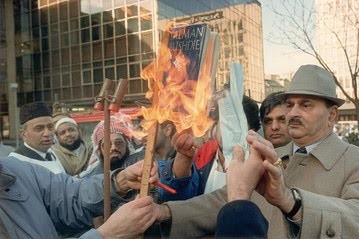
Rushdie went underground and has managed to survive, though some of his translators were not so lucky. But Theo Van Gogh was killed in broad daylight in Amsterdam and Ayan Hirsi Ali was driven underground for producing a supposedly blasphemous movie in liberal Holland. Another blasphemy execution was attempted by textile engineering student Aamir Cheema in Germany. And as expected, Aamir Cheema too has achieved sainthood in Pakistan after he took his own life in a German prison, with his funeral attracting thousands and his grave becoming a popular shrine. A minister in Musharraf’s enlightened cabinet wrote more than one op-ed commending such acts and fantasizing about the day Salman Rushdie’s skin will be torn from his body with sharp hooks. A fantastically surreal movie has even been made about the execution of Rushdie by Muslim Guerillas who penetrate his secret Zionist hideout and attack him with flying Korans.
I am not kidding.
In 2002 a convicted murderer named Tariq decided to atone for his sins by killing a man accused of blasphemy who happened to be in the same prison in Lahore. Director Syed Noor (known for countless song and dance Lollywood films) produced and directed a movie called aik aur ghazi (one more holy warrior) about this young man and his glorious exploit. It is worth noting that Syed Noor is a “moderate Muslim”, but this has not prevented him from glorifying the actions of a vigilante who killed another prisoner because he believed him guilty of blasphemy.
When a poor christian boy was accused of blasphemy in Lahore, the entire colony he lived in was burned to the ground. When a poor Christian woman named Aasia bibi acted “uppity” in front of some Muslim ladies (see details in the video below), she was charged with blasphemy and sentenced to death. These episodes highlights another important aspect of the blasphemy meme: it functions to bully and oppress minorities by threatening them with legalized lynching in exactly the same way as the “uppity nigger” meme was used to bully and oppress black people in the pre-civil-rights South in the United States. The fear of being accused of blasphemy, enforced by periodic horrific lynchings, ensures that Christians, Hindus and Ahmedis never forget their place and act uppity in front of good Muslims, since any indiscretion could lead to a blasphemy accusation and once accused, your goose is cooked.
Aasia Bibi’s death sentence was so flagrantly unjust that Salman Taseer (whose own father had provided a funeral bier for Ilm Deen), the then governor of Punjab, was moved to say she should be let go and the blasphemy law should be amended to prevent such misuse. He was killed by his own guard for saying so. His guard was garlanded and showered with rose petals by Pakistani lawyers when he appeared in court and now has at least one mosque named in his honor.

HE has not been hanged. In fact, he is a hero to many and has been handing out new death sentences of his own while in prison; he convinced one of his guards to go and shoot a 70 year old mentally unstable British man who has been sentenced to death on blasphemy charges but not yet exectuted (probably not yet executed because he is British). MNA Sherry Rahman introduced a “private member bill” to amend the law and was herself charged with blasphemy for her pains (though being a member of the ruling elite, she has not yet been brought to trial). Rashed Rahman, a well known human rights lawyer was shot dead because he dared to take up the case of a young university lecturer who is being tried for blasphemy on insanely ridiculous grounds in Multan. Javed Ahmed Ghamdi, a liberal cleric who has tried to present religious arguments against this law (a law that clearly goes well beyond anything written even in most of the medieval compilations of shariah law) has had his assistant killed and is now living in exile in Malaysia. “Respected” Pakistani religious scholars have declared him to be an apostate and an agent of the enemies of Islam. The law is no closer to repeal or even modification.
And just a few weeks ago, the spineless Lahore High Court upheld the death sentence on Aasia Bibi. She may be hanged before the Governor’s killer.
In fact. the law is now moving on to fresh pastures. There is a sustained push by anti-Shia groups to use the law against Shias just as it is being used against Ahmedis, Christians and other minorities. The law does not specifically mention the issue of blasphemy against the companions of the prophet (the sahaba), but why not? if you insult any of the companions of the prophet, do you not insult the prophet? Never mind that the companions themselves were frequently at each other’s throats, but today the issue is the wedge that will open the way to legal persecution of Shias and help push them into the same position now occupied in daily fear by Christians, Hindus and Ahmedis. Several Shias have already been charged under the law and there is more to come. In fact, on the same day when Shahzad and Shama met their gruesome fate in Kot Radha Kishan, a Shia Zakir was killed in custody in Gujrat. He may have been mentally unstable and had been arrested for brawling in the bazar. In custody, he continues to harangue the police about the calumnies suffered by the Banu Hashim (the family of the prophet) at the hands of some of the companions (the sahaba). This so upset one of the police officers present that he got an axe and decapitated the prisoner inside the police station. The police officer concerned has been arrested and desperate attempts are being made to play down the sectarian dimension of this killing, but all will become clear once the policeman is put on trial. The ASWJ (the main umbrella anti-Shia organization) will protest that he was only defending the honor of the prophet. Punishment will not be easy. “Sweep under the rug” is likely to be the compromise.
In short, while it is indeed true that misuse of the law has become common after General Zia’s time (an intended consequence, as one aim of such laws is to harass and browbeat all potential opposition), the law has deeper roots and liberals who believe that it is possible to make a distinction between true blasphemy and misuse of the law, may find that this line is not easy to draw. The second, and perhaps more potent reason the law will not be repealed is because the law was consciously meant to promote the Islamist project that the deep state (or a powerful section of the deep state) continues to desire in Pakistan. The blasphemy law is a ready-made weapon against all secular opposition to the military-mullah alliance (though some sections of the military now seem to have abandoned that alliance, hence the qualification “section of the deep state”). Secular parties are suspected of being soft on India and are considered a danger to the Kashmir Jihad and other projects dear to the heart of the deep state. At the same time, Islamist parties provide ideological support and manpower for those beloved causes. In this way, the officers of the deep state, even when they are not personally religious, recognize the need for an alliance with religious parties and against secular political forces (Musharraf was a good example). They may have been forced into an uneasy (temporary?) compromise with secular parties by circumstances beyond their control (aka America) but with American withdrawal coming soon, the deep state does not wish to alienate its mullah constituency too much. They will be needed again once the Yankees are gone. Hence too, no repeal at this time.
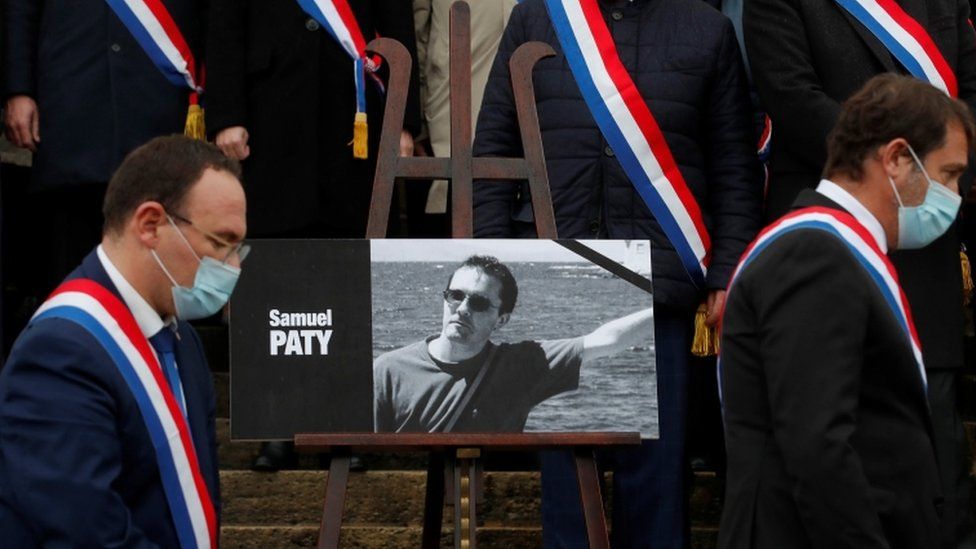




 In Niger, crowds have
In Niger, crowds have 